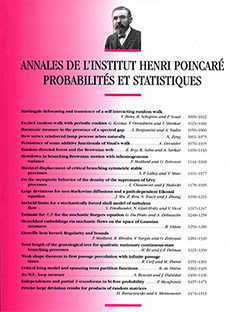Abstract
Suppose that $d\ge1$ and $0<\beta<\alpha<2$. We establish the existence and uniqueness of the fundamental solution $q^{b}(t,x,y)$ to a class of (typically non-symmetric) non-local operators $\mathcal{L}^{b}=\Delta^{\alpha/2}+\mathcal{S}^{b}$, where
\[\mathcal{S}^{b}f(x):=\mathcal{A}(d,-\beta)\int_{\mathbb{R}^{d}}(f(x+z)-f(x)-\nabla f(x)\cdot z\mathbb{1}_{\{|z|\leq1\}})\frac{b(x,z)}{|z|^{d+\beta}}\,dz\] and $b(x,z)$ is a bounded measurable function on $\mathbb{R}^{d}\times\mathbb{R}^{d}$ with $b(x,z)=b(x,-z)$ for $x,z\in\mathbb{R}^{d}$. Here $\mathcal{A}(d,-\beta)$ is a normalizing constant so that $\mathcal{S}^{b}=\Delta^{\beta/2}$ when $b(x,z)\equiv1$. We show that if $b(x,z)\geq-\frac{\mathcal{A}(d,-\alpha)}{\mathcal{A}(d,-\beta)}|z|^{\beta-\alpha}$, then $q^{b}(t,x,y)$ is a strictly positive continuous function and it uniquely determines a conservative Feller process $X^{b}$, which has strong Feller property. The Feller process $X^{b}$ is the unique solution to the martingale problem of $(\mathcal{L}^{b},\mathcal{S}(\mathbb{R}^{d}))$, where $\mathcal{S}(\mathbb{R}^{d})$ denotes the space of tempered functions on $\mathbb{R}^{d}$. Furthermore, sharp two-sided estimates on $q^{b}(t,x,y)$ are derived. In stark contrast with the gradient perturbations, these estimates exhibit different behaviors for different types of $b(x,z)$. The model considered in this paper contains the following as a special case. Let $Y$ and $Z$ be (rotationally) symmetric $\alpha$-stable process and symmetric $\beta$-stable processes on $\mathbb{R}^{d}$, respectively, that are independent to each other. Solution to stochastic differential equations $dX_{t}=dY_{t}+c(X_{t-})\,dZ_{t}$ has infinitesimal generator $\mathcal{L}^{b}$ with $b(x,z)=|c(x)|^{\beta}$.
Supposons que $d\ge1$ et $0<\beta<\alpha<2$. Nous établissons l’existence et l’unicité de la solution fondamentale $q^{b}(t,x,y)$ pour une classe d’opérateurs non locaux (typiquement non symétriques) $\mathcal{L}^{b}=\Delta^{\alpha/2}+\mathcal{S}^{b}$, où
\[\mathcal{S}^{b}f(x):=\mathcal{A}(d,-\beta)\int_{\mathbb{R}^{d}}(f(x+z)-f(x)-\nabla f(x)\cdot z\mathbb{1}_{\{|z|\leq1\}})\frac{b(x,z)}{|z|^{d+\beta}}\,dz\] et $b(x,z)$ est une fonction mesurable bornée sur $\mathbb{R}^{d}\times\mathbb{R}^{d}$ telle que $b(x,z)=b(x,-z)$ pour $x,z\in\mathbb{R}^{d}$. Ici $\mathcal{A}(d,-\beta)$ est la constante de normalisation telle que $\mathcal{S}^{b}=\Delta^{\beta/2}$ quand $b(x,z)\equiv1$. Nous montrons que si $b(x,z)\geq-\frac{\mathcal{A}(d,-\alpha)}{\mathcal{A}(d,-\beta)}|z|^{\beta-\alpha}$, alors $q^{b}(t,x,y)$ est une fonction continue strictement positive qui détermine uniquement un processus de Feller conservatif $X^{b}$, satisfaisant la propriété forte de Feller. Le processus de Feller $X^{b}$ est l’unique solution du problème martingale $(\mathcal{L}^{b},\mathcal{S}(\mathbb{R}^{d}))$, où $\mathcal{S}(\mathbb{R}^{d})$ est l’espace des fonctions tempérées sur $\mathbb{R}^{d}$. De plus, des estimées précises supérieures et inférieures sur $q^{b}(t,x,y)$ sont obtenues. En opposition radicale avec le cas des perturbations gradients, ces estimées montrent des comportements différents pour différents types de $b(x,z)$. Le modèle considéré dans l’article contient le modèle suivant comme cas particulier. Soient $Y$ et $Z$ des processus indépendants $\alpha$-stable, resp. $\beta$-stable, sur $\mathbb{R}^{d}$, symétriques par rotation. La solution de l’équation différentielle stochastique $dX_{t}=dY_{t}+c(X_{t-})\,dZ_{t}$ a $\mathcal{L}^{b}$ pour générateur infinitésimal avec $b(x,z)=|c(x)|^{\beta}$.
Citation
Zhen-Qing Chen. Jie-Ming Wang. "Perturbation by non-local operators." Ann. Inst. H. Poincaré Probab. Statist. 54 (2) 606 - 639, May 2018. https://doi.org/10.1214/16-AIHP816
Information





